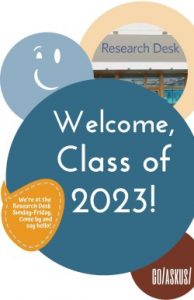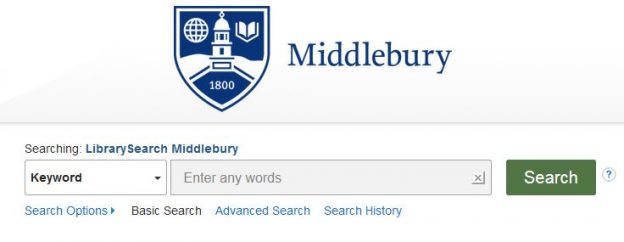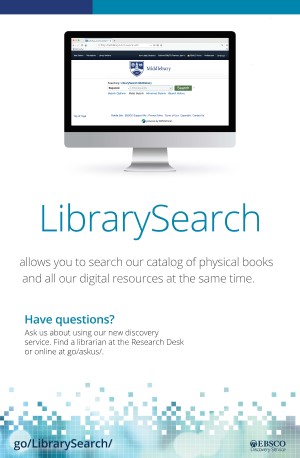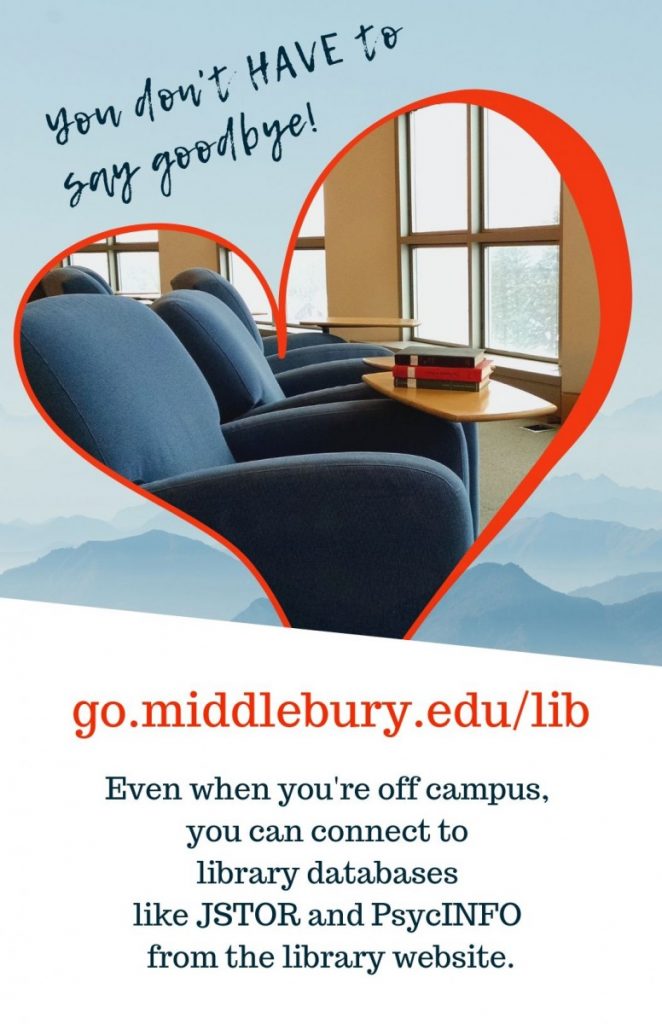Middlebury Libraries is happy to unveil our newest video tutorial for 2019: Citation For People Who Hate Citation. This is a big-picture look at citation: why we do it, what it’s for, and how to make it an easier, stress-free process. Big thanks to Middlebury students Emma Román ’22 and Kayla Moore ’22 for their participation! You can watch the video here, or find it at go/CitationForPeople/.
Tag Archives: Middlebury Community Interest
Open Access Week: What is It?
Open Access Week is an international event that raises awareness of the many benefits of making research free and open for others to use. This year’s theme is “Open for Whom? Equity in Open Knowledge,” which asks libraries and researchers around the world to consider how they will create and support platforms for sharing knowledge that are “inclusive, equitable, and truly serve the needs of a diverse global community. Asking ourselves and our partners ‘open for whom?’ will help ensure that considerations of equity become and remain central… .”
At Middlebury, we are considering “open for whom?” through two goals for the upcoming year: expanding our efforts to support campus-wide diversity, equity, and inclusion initiatives; as well as identifying our role in building and sustaining the infrastructure required for digital scholarship.
Other open access efforts at Middlebury include:
- Digital Collections at Middlebury, our open-source repository that houses digitized works from our archives, along with student theses, scientific datasets, and faculty open access articles.
- The Open Access policy, adopted by faculty in 2016, grants the college a license to republish scholarly essays by faculty in our online repository.
- Lever Press, a consortial open access publisher focusing on “digital-first” online scholarly monographs.
- An examination of digital scholarship infrastructure, supported by a Mellon grant and led by Dean of the Library Mike Roy (along with a multi-school team of library professionals), with the goal of envisioning a more modern and sustainable system that would enhance scholarly communication at colleges, universities, and research libraries.
Finally, are you wondering where to find open access research? Here are a few places to look:
- Open Access on Project MUSE
- Open Content on JSTOR
- Directory of Open Access Journals (DOAJ)
- LibrarySearch, Middlebury’s new discovery service (the replacement for Summon). Find Open Access materials by going to “Search Options” then “Collection” and finally “Open Access Scholarship.” LibrarySearch is still a new service and a work-in-progress, so please get in touch with a librarian with any questions!
Bye-bye Summon, Hello LibrarySearch
The Library has hundreds of databases, indexes and catalogs, providing access to millions of articles, books, films, musical recordings and primary sources. That sounds promising… until it sounds overwhelming. Where should you start your research? We used to recommend Summon, but over the summer, we replaced Summon with LibrarySearch.
Like its predecessor Summon, LibrarySearch is a great place to begin your research. That’s because LibrarySearch links you to nearly everything in our collections. And, we think LibrarySearch is even better than Summon at matching results to your search terms.
We’re still straightening out some of the kinks with our new discovery service. For example, LibrarySearch is linking to materials at the Middlebury Institute of International Studies at Monterey, and it is not linking to many of our online newspapers. So as always, please get in touch with a librarian if you’re not finding what you need.
Next time you’re starting a research project, try LibrarySearch! Look for it at the center of the Library home page, or at go.middlebury.edu/librarysearch.
Deaccessioning Project Formally Begins
This fall, the Library will be starting a multi-year review of our circulating monograph collection in Davis Family Library that will identify titles we can safely remove from our collection. The project was discussed with department heads and chairs last spring. A web guide is available with much more information, including definition of the materials under review (spoiler alert: only circulating books, and nothing else). We are doing this for several reasons:
- The Davis Family Library’s shelves are functionally full. While you’ll see empty or partially filled shelves in places, a library needs to keep roughly 20% of its shelf space clear in order to reshelve and shift books, which is necessary when we acquire new materials.
- The collection has not been systematically reviewed as a whole in decades, and we have on our shelves materials that are outdated, superseded, and/or no longer relevant to Middlebury’s academic program.
- The library is short on study rooms and other usable spaces for students and faculty.
The process will be deliberative and consultative, and we invite your participation. Here is how the process will unfold:
- We have analyzed the 600,000 titles in Davis Family Library and automatically marked for retention titles that were recently acquired or heavily used, or which we must retain due to our consortial obligations. This reduced the number of titles under consideration for withdrawal to 229,000.
- We have created a website (Monograph Deselection Project) that lists all of the titles under consideration, organized by subject, where you can see details about each title, including its usage history, date of publication, and more.
- Starting this fall, librarians will review the titles under consideration for withdrawal, and will make preliminary decisions about which titles to remove.
- As these preliminary reviews are completed, we will share with departments and other interested faculty our recommendations on which titles to remove, and provide you a chance to weigh in.
- Some materials may be moved into Special Collections if they have acquired an historical or other kind of value, rather than being withdrawn outright.
We’ll conduct these reviews in batches over the course of the next few years. Your Library Liaison will let you know when collections pertinent to your academic field(s) are under review. Because many faculty teach and do research in areas outside their departmental homes, we also invite those who wish to review any particular subjects to let us know via http://go.middlebury.edu/listrequest so that we can inform you when that subject is being reviewed.
Collection review is a critical part of the work of sustaining a vital, vibrant, and relevant print collection. While we recognize that it is daunting to make hard decisions about the importance of hundreds of thousands of titles, we have created, with useful help from consultations with chairs and with our advisory committee, what we think is a simple and straightforward process that provides you with the opportunity to give us valuable input into these decisions. Again, much more information is available on the project’s web guide.
Please let us know if you have any questions or concerns.
Welcome to the Libraries, Class of 2023!
Welcome to the Libraries! Come and say hello to a librarian at the Research Desk. We provide expert research help, bookmarks, collectible library pins and (sometimes) candy! Find us on the main level of the Davis Family Library.

Fall Research Desk Hours
(September 9 – December 13)
- Sunday 2pm-5pm
- Monday 11am-5pm and 7pm-9:30pm
- Tuesday 11am-5pm and 7pm-9:30pm
- Wednesday 11am-5pm and 7pm-9:30pm
- Thursday 11am-5pm
- Friday 11am-4pm
And online anytime at:
go.middlebury.edu/askalibrarian
No one’s at the Research Desk?
Visit us in our offices! Librarians are conveniently located right behind the Research Desk.
What about the Armstrong Library?
A librarian is available most days at the Armstrong Library in McCardell Bicentennial Hall, too. Just ask!

LibrarySearch!
LibrarySearch is here!
The library has switched its discovery platform from Summon to one from EBSCO, which we are calling “LibrarySearch.” LibrarySearch will work very much like Summon: it will still retrieve results from the library catalog (MIDCAT), and it will still find article-level results from our subscribed journals and databases (as well as beyond, if desired).
We made this switch for a number of reasons. LibrarySearch:
- offers better discovery of non-full-text indexes such as MLA Bibliography and RILM (in fact, these databases are not indexed by Summon, due to their dissatisfaction with how Summon handles non-full-text databases)
- has features not available in Summon, such as a view into which databases search results are coming from, and the option to save search results directly into online storage providers such as Dropbox
- is more tightly integrated with the library’s catalog than Summon
- is (like Summon) a very stable and widely-used system
- is highly customizable
- is also now available to students and colleagues at the William Tell Coleman library at the Middlebury Institute of International Studies
Of course, since LibrarySearch is provided to us by a different vendor, you will see changes in how search results are ranked and displayed, and the interface will look somewhat different.
Please see go/librarysearch to try out the new system. As with any new system, there are bound to be some bugs, broken links, unexpected results or behavior, etc. Please submit problems, or suggestions for improvements, to Terry Simpkins in the Library (x5045).
How to use library databases from off campus
You don’t have to say goodbye! Even when you’re off campus, you can connect to library databases like JSTOR and PsycINFO from the library website:
Links that are on library web pages (a few examples include Research Guides, Summon and the Journals list) will ask you to log in with Midd credentials when you’re not on campus. It’s as easy as that!
Seniors: Here’s how to get alumni access to library databases!
ILLiad scheduled upgrade and down-time
The ILLiad Web pages will be down at 9:00 am on Tuesday 1/8/19 while we upgrade the ILLiad software. The ILL web site should be inaccessible for only a short time, assuming all goes well with the update.
If anyone has problems after 2:00 pm please contact Rachel Manning at x5498 or rmanning@middlebury.edu for assistance.


You must be logged in to post a comment.